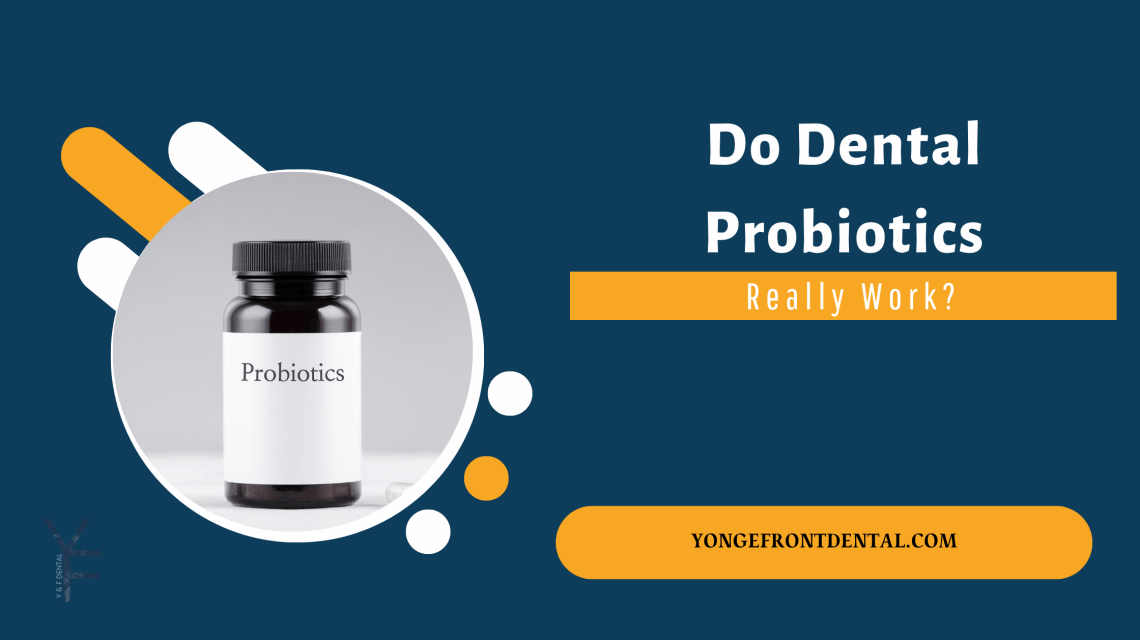In recent years, the conversation around oral health has expanded beyond just brushing and flossing. As our understanding of the mouth’s complex ecosystem deepens, dental professionals and patients alike are exploring new approaches to maintaining oral wellness.
Do Dental Probiotics Really Work for Oral Health
Among these emerging solutions, dental probiotics have garnered significant attention. At Yonge and Front Dental in Toronto, we’re committed to providing our patients with evidence-based information about the latest advances in dental care. This comprehensive guide examines what dental probiotics are, how they function, and what current research tells us about their effectiveness.
Dental Probiotics
Dental probiotics are beneficial bacteria specifically formulated to support oral health. Unlike digestive probiotics that target gut health, dental probiotics are designed to establish a balanced microbiome within the mouth.
What exactly are dental probiotics?
Dental probiotics contain live beneficial bacterial strains that naturally occur in healthy mouths. These “good bacteria” are intended to compete with and reduce harmful bacteria that contribute to common oral health issues.
The most commonly studied bacterial strains in dental probiotics include:
- Streptococcus salivarius K12 and M18– Known for their ability to produce antimicrobial compounds
- Lactobacillus reuteri– Researched for effects on periodontal health
- Bifidobacterium– Studied for potential cavity-fighting properties
- Lactobacillus brevis– Associated with reduction in gum inflammation
These beneficial bacteria are available in various forms, including lozenges, chewable tablets, mouth rinses, toothpastes, and gums. Each delivery method offers different advantages in terms of exposure time and coverage area within the oral cavity.
The Science Behind the Oral Microbiome
To understand how dental probiotics work, we must first appreciate the complex world of the oral microbiome.
Your mouth is home to over 700 species of bacteria forming a delicate ecosystem. When in balance, this microbiome contributes to good oral health. However, factors such as diet, medication, stress, and inconsistent oral hygiene can disrupt this balance, potentially leading to issues like tooth decay, gum disease, and halitosis (bad breath).
The oral microbiome doesn’t exist in isolation it connects to your overall health in surprising ways. Research has established links between oral bacteria and conditions such as:
- Cardiovascular disease
- Diabetes complications
- Respiratory infections
- Pregnancy complications
- Rheumatoid arthritis
This connection between oral and systemic health underscores why maintaining a healthy balance of oral bacteria matters beyond just preventing cavities or freshening breath.

Evidence-Based Benefits of Dental Probiotics
The question remains: do dental probiotics actually work? Let’s examine what scientific research tells us about their potential benefits.
Bad Breath Reduction
Some of the strongest evidence for dental probiotics relates to their ability to address halitosis. Multiple clinical studies have demonstrated that certain probiotic strains, particularly S. salivarius K12, can significantly reduce volatile sulfur compounds the primary culprits behind bad breath.
A 2019 systematic review published in the Journal of Evidence-Based Dental Practice found that subjects using probiotics experienced a measurable decrease in halitosis compared to control groups. These effects typically became noticeable after 2-4 weeks of consistent use.
Cavity Prevention
Research on probiotics for cavity prevention shows promising results, though the evidence isn’t quite as robust as for halitosis.
Studies focusing on the S. salivarius M18 strain have demonstrated its ability to:
- Produce enzymes that neutralize acid
- Break down dental plaque
- Reduce levels of Streptococcus mutans (the primary bacteria associated with tooth decay)
A 2018 clinical trial published in Clinical Oral Investigations found that children who used probiotic lozenges for three months showed lower levels of cavity-causing bacteria and reduced plaque formation compared to the placebo group.

Gum Disease Management
Gum disease begins with gingivitis (gum inflammation) and can progress to periodontitis, which damages the soft tissue and bone supporting teeth. Research indicates that certain probiotic strains may help manage these conditions.
Studies using Lactobacillus reuteri have shown particular promise. A 2021 meta-analysis in the Journal of Periodontology reviewed 12 randomized controlled trials and concluded that probiotic supplementation, when used alongside professional periodontal treatment, led to improved clinical outcomes including:
- Reduced gingival bleeding
- Decreased pocket depth
- Lower levels of inflammatory markers
These findings suggest that probiotics could serve as a valuable adjunct to traditional periodontal therapy.
Limitations and Considerations
Despite the promising research, several important limitations and considerations should be noted when evaluating dental probiotics.
Research Gaps
The field of dental probiotics is still developing, with several notable gaps in our understanding:
- Long-term effects remain largely unstudied
- Optimal dosages haven’t been standardized
- Questions remain about how long benefits persist after discontinuation
- Many studies have small sample sizes or methodological limitations
Product Quality Variability
The probiotic market is less regulated than pharmaceutical products. This results in considerable variation in:
- Bacterial strain selection and combinations
- Colony-forming unit (CFU) counts
- Shelf stability and viability
- Manufacturing quality control
When selecting dental probiotics, looking for products that have been tested in clinical trials and provide specific strain information is crucial.
Individual Response Differences
Not everyone responds identically to probiotic therapy. Factors affecting individual response include:
- Existing oral microbiome composition
- Oral hygiene practices
- Diet
- Medication use (particularly antibiotics)
- Underlying health conditions
This variability underscores the importance of personalized recommendations from dental professionals.

How to Choose the Right Dental Probiotics
Selecting an effective dental probiotic involves considering several key factors:
Bacterial Strains
Look for products containing strains with clinical evidence supporting their oral health benefits:
- S. salivarius K12 and M18 for general oral health and halitosis
- L. reuteri for gum health
- Bifidobacterium for cavity prevention
Delivery Method
The method of delivery affects how probiotics interact with your oral environment:
- Lozenges and chewable tablets– Allow for extended contact time
- Mouth rinses– Provide broader coverage but shorter contact time
- Toothpastes– Convenient but may have limited probiotic survival due to other ingredients
CFU Count and Viability
Higher CFU (colony-forming unit) counts don’t necessarily mean better results. More important factors include:
- Whether the bacteria remain viable until use
- If they can survive the journey to the intended site of action
- Whether the strains work synergistically
Products requiring refrigeration often maintain higher viability, but proper storage is essential.
Integrating Dental Probiotics Into Your Oral Care Routine
If you’re considering adding dental probiotics to your oral care regimen, these practical guidelines can help you incorporate them effectively:
Timing Considerations
For maximum effectiveness:
- Take probiotics after brushing and flossing
- Use at least 30 minutes after antimicrobial mouthwashes
- Consider night use, when saliva flow is reduced and bacteria have more time to colonize

Complementary Practices
Dental probiotics work best as part of a comprehensive oral health approach that includes:
- Regular brushing (twice daily)
- Daily flossing
- Balanced diet low in refined sugars
- Adequate hydration
- Regular dental check-ups and cleanings
Remember that probiotics complement rather than replace these fundamental practices.
What to Expect
When starting dental probiotics:
- Results typically aren’t immediate allow 2-4 weeks for noticeable effects
- Consistency is key for maintaining benefits
- Some people experience temporary mild changes in taste perception
Professional Guidance: The Yonge and Front Dental Approach
At Yonge and Front Dental, we take a thoughtful, evidence-based approach to dental probiotics. During your consultation, our team:
- Conducts a thorough assessment of your oral health status
- Reviews your dental history and specific concerns
- Discusses lifestyle factors that may influence your oral microbiome
- Provides personalized recommendations based on current scientific evidence
We believe in dental care that addresses root causes rather than just symptoms. For some patients, dental probiotics may offer significant benefits when incorporated into a customized treatment plan.
Conclusion: Are Dental Probiotics Worth Trying?
The current body of research suggests that dental probiotics show genuine promise for supporting oral health, particularly for specific concerns like bad breath and as complementary therapy for gum disease. While they’re not a miracle solution or replacement for fundamental oral hygiene practices, they represent an innovative approach to oral health that aligns with our growing understanding of the mouth as a complex ecosystem.
For patients interested in exploring dental probiotics, we recommend seeking professional guidance rather than self-prescribing. At Yonge and Front Dental, we’re committed to staying current with emerging research and providing our patients with evidence-based recommendations tailored to their unique oral health needs.
If you’re curious about whether dental probiotics might benefit your oral health, we invite you to schedule a consultation with our team. Together, we can evaluate your specific situation and determine the most effective approach to achieving and maintaining your healthiest smile.
FAQs About Dental Probiotics
Are dental probiotics safe for everyone?
Dental probiotics are generally considered safe for most people. However, individuals with compromised immune systems, critical illnesses, or certain medical conditions should consult with healthcare providers before use.
How long does it take to see results from dental probiotics?
Most people begin noticing effects after 2-4 weeks of consistent use, though this varies depending on the specific concern being addressed and individual factors.
Can dental probiotics replace regular brushing and flossing?
No. Dental probiotics should complement, never replace, fundamental oral hygiene practices like brushing, flossing, and regular dental check-ups.
Do I need a prescription for dental probiotics?
Most dental probiotics are available over-the-counter. However, getting professional recommendations on specific products and protocols can significantly improve your results.
How do dental probiotics differ from antimicrobial mouthwash?
Antimicrobial mouthwashes work by killing bacteria broadly, including both harmful and beneficial types. Dental probiotics take the opposite approach by introducing beneficial bacteria to create a healthier balance in the oral microbiome.


